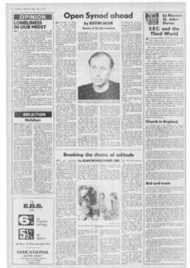Page 5, 23rd July 1971
Page 5

Report an error
Noticed an error on this page?If you've noticed an error in this article please click here to report it.
Tags
Share
Related articles
The Dutch Quest For God
Homosexual Telephone Service Backed By Bishop
Uphill Task For Pope In Dutch Unity Bid
Mutiny, Hope And Bewilderment In Dutch Church
City Parishes Adopt ' Leakage ' Areas
'WORKSHOP' QUEST FOR FAITH
FEW Catholics will have been shocked by Brian Cooper's account of the aberrations being practised in the "famous" Amsterdam parish of St. Dominic's, for this is a field in which most of us are shockproof by now. It was the title "The Dutch Quest for God" that shocked us.
When (and why) did they lose Him? And will they find him in the "worship workshop" goings-on which Mr. Cooper hails with such naïve euphoria?
Sunday morning "Eucharists" with Rabbi and priest coming together to read and interpret the Old Testament (though their interpretations could not be within an ass's roar of one another; Catholics and Buddhists praying together before the attar (can it be. in any true sense of the word, a sacrificial altar?); and sermons which are mere feed-backs of what the laity has prescribed for itself beforehand.
Eucharist and Bible services are "run" (a nice word this) by the Catholic-Protestant (Lutheran, Reformed, and Remonstrant) University Fellowship of the Gospel, whilst a priest chats with the audience in the pews and coffee pots simmer cheerily at the side of the nave.
So why all this fuss about ecumenism? Abandon dogma and triumphalism and authoritative teaching and the thing is done.
Inter communion? Don't worry about it. The Dutch don't even discuss it. They simply do art, Mr. Cooper tells us. In open disobedience to Rome? But Rome is old hat, and you can forget it. Thomas More and Jahn Fisher have been a long time dead and they died for "theological abstractions".
But Mr. Cooper really wins the watch when he says, speaking of a Trappist monastery which straddles the DutchBelgian 'border: "If its geographical 'position is eccentric, its life-style (sic) is not."
All these "Trappists" have done is to abandon "asceticism behind closed doors," and replace it by (an ancient Trappist discipline this, apparently) "joyful openness to the real world."
"Everything has changed," a brother put it to Mr. Cooper. "Now we are more human." (More human than the monks of old ! Ye ancient gods and little fishes.) "We used to think of our world on the inside as a little paradise, and the world outside as evil."
If they thought this it is no wonder they went off the rails, for this was no part of the Trappist tradition that dotted Europe with monasteries. The Trappists never thought of their enclosure as a paradise; and they left the world, not because they despised it but because they knew that their prayers and work and silence and asceticism would help to keep it on an even keel.
This border-straddling monstrosity which Mr. Cooper sees as a flowering of the new Pentecostal spirit may be an interesting experiment, but one thing it certainly is not it is not a Trappist monastery. And the goings-on in Amsterdam are yet another sign that, as Henry de Lubec, S.J., puts it, "a new Church, a different Church from that of Jesus Christ is trying to establish itself . . . a movement of general abdication under the pretext of renewal, ecumenism, adaptation."
John I). Sheridan Dublin 6
blog comments powered by Disqus









